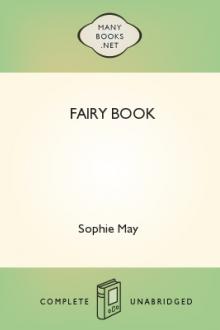The Roots of the Mountains<br />Wherein Is Told Somewhat of the Lives of the Men of Burgdale, Their by William Morris (best sales books of all time .txt) 📗

- Author: William Morris
Book online «The Roots of the Mountains<br />Wherein Is Told Somewhat of the Lives of the Men of Burgdale, Their by William Morris (best sales books of all time .txt) 📗». Author William Morris
‘Face-of-god, I would ask thee a gift.’
‘All gifts,’ he said, ‘that thou mayest ask, and I may give, lie open to thee.’
She said: ‘If I be alive when the time comes this gift thou mayst well give me.’
‘Sweet kinswoman,’ said he, ‘tell me what it is that thou wouldest have of me.’ And he was ill-at-ease as he waited for her answer.
She said: ‘Ah, kinsman, kinsman! Woe on the day that maketh kinship accursed to me because thou desirest it!’
He held his peace and was exceeding sorry; and she said:
‘This is the gift that I ask of thee, that in the days to come when thou art wedded, thou wilt give me the second man-child whom thou begettest.’
He said: ‘This shalt thou have, and would that I might give thee much more. Would that we were little children together other again, as when we played here in other days.’
She said: ‘I would have a token of thee that thou shalt show to the God, and swear on it to give me the gift. For the times change.’
‘What token wilt thou have?’ said he.
She said: ‘When next thou farest to the Wood, thou shalt bring me back, it maybe a flower from the bank ye sit upon, or p. 96a splinter from the daïs of the hall wherein ye feast, or maybe a ring or some matter that the strangers are wont to wear. That shall be the token.’
She spoke slowly, hanging her head adown, but she lifted it presently and looked into his face and said:
‘Woe’s me, woe’s me, Gold-mane! How evil is this day, when bewailing me I may not bewail thee also! For I know that thine heart is glad. All through the winter have I kept this hidden in my heart, and durst not speak to thee. But now the spring-tide hath driven me to it. Let summer come, and who shall say?’
Great was his grief, and his shame kept him silent, and he had no word to say; and again she said:
‘Tell me, Gold-mane, when goest thou thither?’
He said: ‘I know not surely, may happen in two days, may happen in ten. Why askest thou?’
‘O friend!’ she said, ‘is it a new thing that I should ask thee whither thou goest and whence thou comest, and the times of thy coming and going. Farewell to-day! Forget not the token. Woe’s me, that I may not kiss thy fair face!’
She spread her arms abroad and lifted up her face as one who waileth, but no sound came from her lips; then she turned about and went away as she had come.
But as for him he stood there after she was gone in all confusion, as if he were undone: for he felt his manhood lessened that he should thus and so sorely have hurt a friend, and in a manner against his will. And yet he was somewhat wroth with her, that she had come upon him so suddenly, and spoken to him with such mastery, and in so few words, and he with none to make answer to her, and that she had so marred his pleasure and his hope of that fair day. Then he sat him down again on the flowery bank, and little by little his heart softened, and he once more called to mind many a time when they had been there before, and the plays and the games they had had together there when they were little. And he bethought him of the days that were long to him then, p. 97and now seemed short to him, and as if they were all grown together into one story, and that a sweet one. Then his breast heaved with a sob, and the tears rose to his eyes and burned and stung him, and he fell a-weeping for that sweet tale, and wept as he had wept once before on that old dyke when there had been some child’s quarrel between them, and she had gone away and left him.
Then after a while he ceased his weeping, and looked about him lest anyone might be coming, and then he arose and went to and fro in the chestnut-grove for a good while, and afterwards went his ways from that meadow, saying to himself: ‘Yet remaineth to me the morrow of to-morrow, and that is the first of the days of the watching for the token.’
But all that day he was slow to meet the eyes of men; and in the hall that eve he was silent and moody; for from time to time it came over him that some of his manhood had departed from him.
CHAPTER XVII. THE TOKEN COMETH FROM THE MOUNTAIN.The next day wore away tidingless; and the day after Face-of-god arose betimes; for it was the first day of his watch, and he was at the Maiden Ward before the time appointed on a very fair and bright morning, and he went to and fro on that place, and had no tidings. So he came away somewhat cast down, and said within himself: ‘Is it but a lie and a mocking when all is said?’
On the morrow he went thither again, and the morn was wild and stormy with drift of rain, and low clouds hurrying over the earth, though for the sunrise they lifted a little in the east, and the sun came up over the passes, amidst the red and angry rack of clouds. This morn also gave him no tidings of the token, and he p. 98was wroth and perturbed in spirit: but towards evening he said:
‘It is well: ten days she gave me, so that she might be able to send without fail on one of them; she will not fail me.’
So again on the morrow he was there betimes, and the morn was windy as on the day before, but the clouds higher and of better promise for the day. Face-of-god walked to and fro on the Maiden Ward, and as he turned toward Burgstead for the tenth time, he heard, as he deemed, a bow-string twang afar off, and even therewith came a shaft flying heavily like a winged bird, which smote a great standing stone on the other side of the way, where of old some chieftain had been buried, and fell to earth at its foot. He went up to it and handled it, and saw that there was a piece of thin parchment wrapped about it, which indeed he was eager to unwrap at once, but forebore; because he was on the highway, and people were already astir, and even then passed by him a goodman of the Dale with a man of his going afield together, and they gave him the sele of the day. So he went along the highway a little till he came to a place where was a footbridge over into the meadow. He crossed thereby and went swiftly till he reached a rising ground grown over with hazel-trees; there he sat down among the rabbit-holes, the primrose and wild-garlic blooming about him, and three blackbirds answering one another from the edges of the coppice. Straightway when he had looked and seen none coming he broke the threads that were wound about the scroll and the arrow, and unrolled the parchment; and there was writing thereon in black ink of small letters, but very fair, and this is what he read therein:
Come thou to the Mountain Hall by the path which thou knowest of, on the morrow of the day whereon thou readest this. Rise betimes and come armed, for there are other men than we in the wood; to whom thy death should be a gain. When thou art come to the Hall, thou shalt find no man therein; but a great hound only, tied to a bench nigh the daïs. Call him by his name, Sure-foot to wit, and give him to eat from the meat upon the board, and give him water p. 99to drink. If the day is then far spent, as it is like to be, abide thou with the hound in the hall through the night, and eat of what thou shalt find there; but see that the hound fares not abroad till the morrow’s morn: then lead him out and bring him to the north-east corner of the Hall, and he shall lift the slot for thee that leadeth to the Shadowy Yale. Follow him and all good go with thee.
Now when he had read this, earth seemed fair indeed about him, and he scarce knew whither to turn or what to do to make the most of his joy. He presently went back to Burgstead and into the House of the Face, where all men were astir now, and the day was clearing. He hid the shaft under his kirtle, for he would not that any should see it; so he went to his shut-bed and laid it up in his chest, wherein he kept his chiefest treasures; but the writing on the scroll he set in his bosom and so hid it. He went joyfully and proudly, as one who knoweth more tidings and better than those around him. But Stone-face beheld him, and said ‘Foster-son, thou art happy. Is it that the spring-tide is in thy blood, and maketh thee blithe with all things, or hast thou some new tidings? Nay, I would not have an answer out of thee; but here is good rede: when next thou goest into the wood, it were nought so ill for thee to have a valiant old carle by thy side; one that loveth thee, and would die for thee if need were; one who might watch when thou wert seeking. Or else beware! for there are evil things abroad in the Wood, and moreover the brethren of those two felons who were slain at Carlstead.’
Then Gold-mane constrained himself to answer the old carle softly; and he thanked him kindly for his offer, and said that so it should be before long. So the talk between them fell, and Stone-face went away somewhat well-pleased.
And now was Face-of-god become wary; and he would not draw men’s eyes and speech on him; so he went afield with Hall-face to deal with the lambs and the ewes, and did like other men. No less wary was he in the hall that even, and neither spake much nor little; and when his father spake to him concerning the Bride, p. 100and made game of him as a somewhat sluggish groom, he did not change countenance, but answered lightly what came to hand.
On the morrow ere the earliest dawn he was afoot, and he clad himself and did on his hauberk, his father’s work, which was fine-wrought and a stout defence, and reached down to his knees; and over that he did on a goodly green kirtle well embroidered: he girt his war-sword to his side, and it was the work of his father’s father, and a very good sword: its name was Dale-warden. He did a good helm on his head, and slung a targe at his back, and took two spears in his hand, short but strong-shafted and well-steeled. Thus arrayed he left Burgstead before the dawn, and came to Wildlake’s Way and betook him to the Woodland. He made no stop or stay on the path, but ate his meat standing by an oak-tree close by the half-blind track. When he came to the little wood-lawn, where was the toft of the ancient house, he looked all round about him, for he deemed that a likely place for those ugly wood-wights to set on him; but nought befell him, though he stooped and drank of the woodland rill warily enough. So he passed on; and there were other places also where he fared warily, because they seemed like to hold lurking felons; though forsooth the whole wood might well serve their turn. But no evil befell him, and at last, when it yet lacked an hour to sunset, he came to the wood-lawn where Wild-wearer had made his onset that other eve.
He went straight up to the house, his heart beating, and he scarce believing but that he should find the Friend abiding him there: but when he pushed the door it gave way before him at once, and he entered and found no man therein, and the walls stripped bare and no shield or weapon hanging on the panels. But the hound he saw tied to a bench nigh the daïs, and the bristles on the beast’s neck arose, and he snarled on Face-of-god, and strained on his leathern leash. Then Face-of-god went up to him and called him by his name, Sure-foot, and gave him his hand to lick, and he brought him water, and fed him





Comments (0)